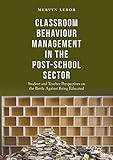Classroom Behaviour Management in the Post-School Sector [electronic resource] : Student and Teacher Perspectives on the Battle Against Being Educated / by Mervyn Lebor.
Material type: TextPublisher: Cham : Springer International Publishing : Imprint: Palgrave Macmillan, 2017Description: X, 228 p. online resourceContent type: text Media type: computer Carrier type: online resourceISBN: 9783319570518Subject(s): Education | School management and organization | School administration | Teaching | Assessment | Lifelong learning | Adult education | Education | Lifelong Learning/Adult Education | Teaching and Teacher Education | Learning & Instruction | Assessment, Testing and Evaluation | Administration, Organization and Leadership | Schools and SchoolingAdditional physical formats: Printed edition:: No titleDDC classification: 374 LOC classification: LC5201-6660.4Online resources: e-book Full-text access
TextPublisher: Cham : Springer International Publishing : Imprint: Palgrave Macmillan, 2017Description: X, 228 p. online resourceContent type: text Media type: computer Carrier type: online resourceISBN: 9783319570518Subject(s): Education | School management and organization | School administration | Teaching | Assessment | Lifelong learning | Adult education | Education | Lifelong Learning/Adult Education | Teaching and Teacher Education | Learning & Instruction | Assessment, Testing and Evaluation | Administration, Organization and Leadership | Schools and SchoolingAdditional physical formats: Printed edition:: No titleDDC classification: 374 LOC classification: LC5201-6660.4Online resources: e-book Full-text access | Item type | Current library | Collection | Call number | Copy number | Status | Notes | Date due | Barcode |
|---|---|---|---|---|---|---|---|---|
| E-Books | MEF eKitap Kütüphanesi | Springer Nature | LC5201 -6660.4 (Browse shelf (Opens below)) | Available | NATURE | 1419724-1001 |
Chapter 1. Introduction -- Chapter 2. In Theory it All Works.... -- Chapter 3. Entering the Classroom -- Chapter 4. What do Experienced Tutors Advise? -- Chapter 5. What Role does Assessment Play? Case Studies -- Chapter 6. Could Class Management be a Management Issue? -- Chapter 7. Student Voices: So Why do Disruptive Students Say They Disrupt Classes? -- Chapter 8. A Methodology for Supporting Tutors Who Face Challenging Classes -- Chapter 9. What Could Possibly be Problematic About Digital Learning? -- Chapter 10. And How do Teacher Educators Prepare Trainee Teachers for Disruptive Classes? -- Chapter 11. What do Trainees Think of Their Preparation? -- Chapter 12. A Possible Module to Prepare Teachers for Disruptive Behaviour.
This book listens to the voices of post-school teachers, managers, theorists, trainees, teacher educators and students talking about the battle against being educated. It analyses models of classroom behaviour management, with examples of theory critiquing practice and practice criticizing theory. The contextual pressures of manageralism, demands imposed by Ofsted, economic survival for institutions based on student numbers, and mandatory attendance requirements have all meant ever-increasing pressures on teachers dealing with students' violent, disruptive and challenging behaviours, resulting in some highly disordered classrooms in many institutions. Lebor examines the attitudes of stakeholders, including disruptive students, teachers, trainees and managers, and explores a range of issues such as entering the classroom, abuse of computers and technology equipment, overt violence in classrooms, and counter-productive assessment processes, as well as exploring a range of available solutions to the problem. The book will be compelling reading for teachers, teacher educators, trainees, policy-makers, managers in education, but also anyone interested in education and training. .
5
